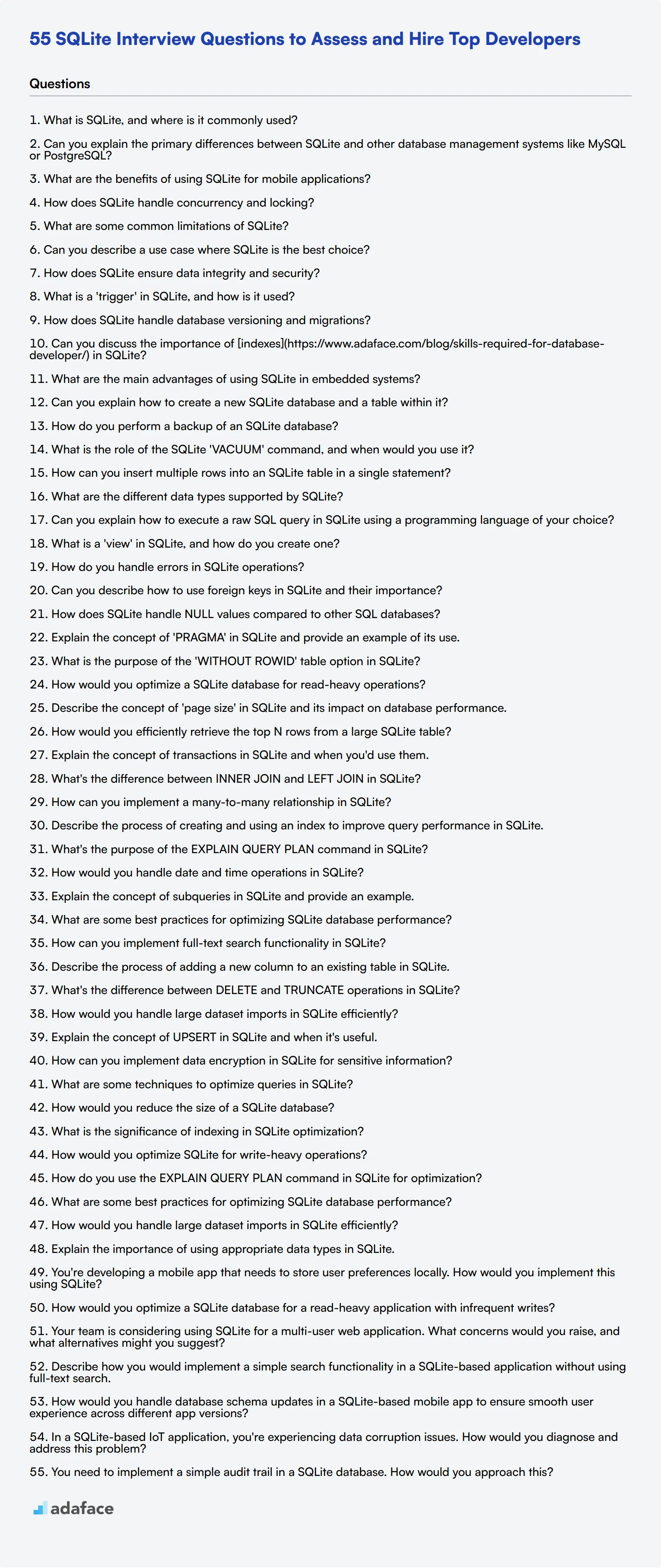Finding the right talent for SQLite database management roles can be challenging for recruiters and hiring managers. Crafting the right set of interview questions is important to accurately gauge a candidate's technical skills and understanding of SQLite beyond what's written on their resume.
This blog post is about providing you with a comprehensive list of SQLite interview questions and answers suitable for various skill levels from junior to advanced developers. Each section focuses on different aspects of SQLite, like basic concepts, intermediate knowledge, database operations, optimization techniques, and situational questions.
By using this list, you can streamline your interview process and ensure you're asking relevant questions that will help you identify top candidates. Leverage our SQLite online test along with these questions to pre-screen applicants effectively before diving into interviews.
Table of contents
10 basic SQLite interview questions and answers to assess applicants
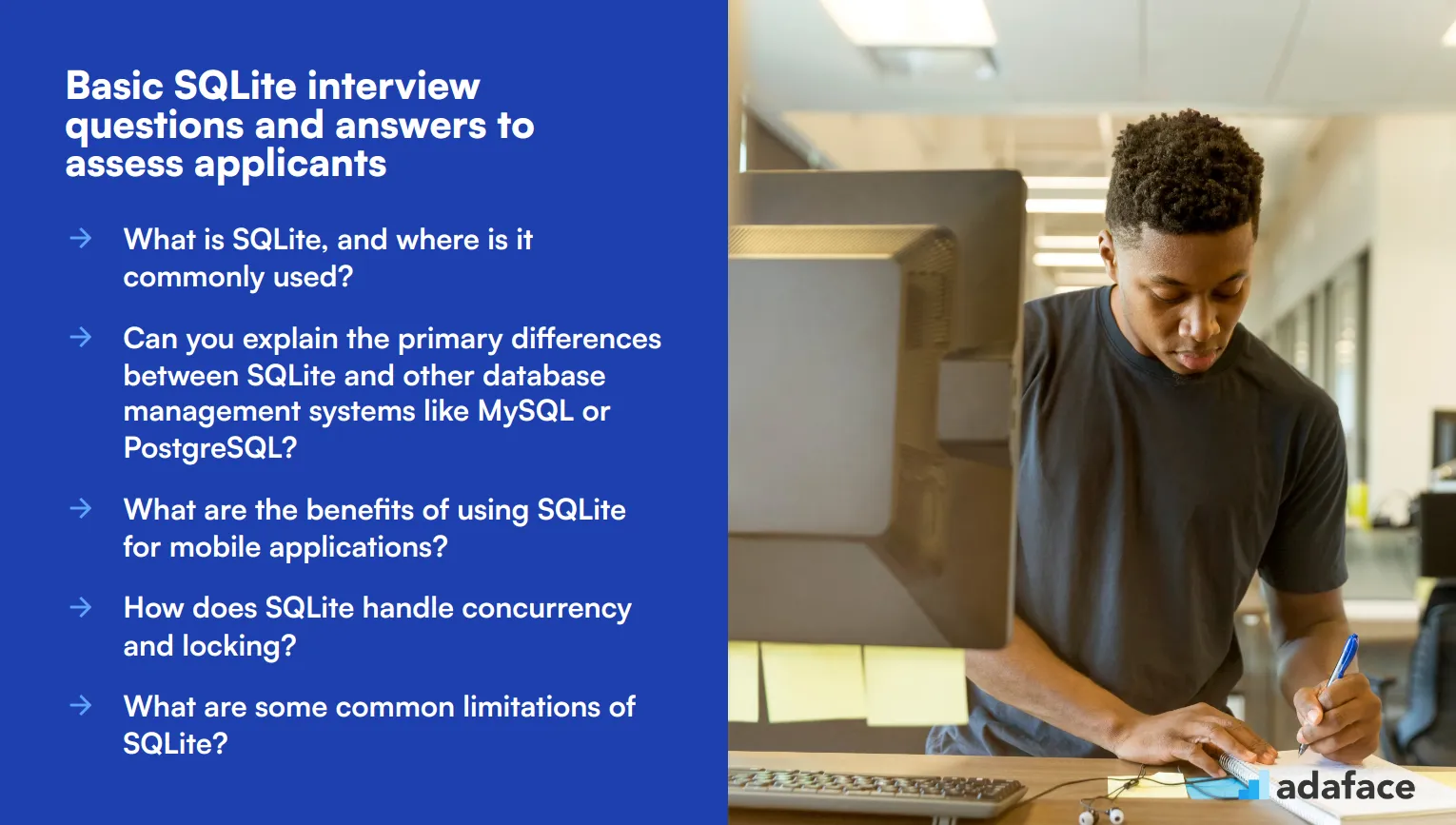
Looking to assess an applicant's basic understanding of SQLite? Use this list of questions to gauge their knowledge and ensure they have the essential skills. These questions are designed to be straightforward and effective in a face-to-face interview setting.
1. What is SQLite, and where is it commonly used?
SQLite is a lightweight, disk-based database that doesn’t require a separate server process. It's self-contained, serverless, and zero-configuration. This makes it ideal for embedded systems and applications that need to store data locally, such as mobile apps and IoT devices.
An ideal response should demonstrate the candidate's understanding of SQLite's key features and typical use cases. Look for mentions of its lightweight nature, serverless architecture, and common applications.
2. Can you explain the primary differences between SQLite and other database management systems like MySQL or PostgreSQL?
SQLite is a file-based database, which means it stores the entire database in a single file. Unlike MySQL or PostgreSQL, which are client-server databases, SQLite is serverless and does not require a separate server process.
Look for candidates to mention that SQLite is designed for simplicity and is ideal for small to medium-sized applications, whereas MySQL and PostgreSQL are more suited for larger, more complex applications that require robust performance and scalability.
3. What are the benefits of using SQLite for mobile applications?
SQLite is lightweight and requires minimal setup, making it perfect for mobile applications. It has a small footprint and can run efficiently with limited resources, which is crucial for mobile environments.
Candidates should highlight SQLite's ease of use, reliability, and its ability to handle concurrent read/write operations smoothly, which are critical for mobile app performance.
4. How does SQLite handle concurrency and locking?
SQLite uses a unique locking mechanism to handle concurrency. It employs a multi-tiered locking strategy, including read, reserved, pending, and write locks, to manage access to the database file.
Candidates should explain that SQLite allows multiple processes to read from the database simultaneously but restricts write operations to ensure data integrity. Look for clarity on how SQLite balances performance and consistency.
5. What are some common limitations of SQLite?
SQLite has some limitations, such as a lack of built-in user management and relatively limited support for concurrent write operations. It's not designed for high-traffic, high-concurrency environments typical of large-scale web applications.
An ideal candidate should acknowledge these limitations and discuss scenarios where other database systems like PostgreSQL or MySQL might be more appropriate.
6. Can you describe a use case where SQLite is the best choice?
SQLite is an excellent choice for embedded systems, single-user applications, and small to medium-sized projects where simplicity, speed, and portability are essential. Examples include mobile apps, desktop applications, and small web applications.
Candidates should provide specific examples and justify why SQLite's features make it suitable for these scenarios. Look for practical understanding and relevant experience.
7. How does SQLite ensure data integrity and security?
SQLite provides data integrity through atomic commit and rollback operations, which ensure that transactions are fully completed or not applied at all. It uses a Write-Ahead Logging (WAL) mode to improve reliability.
Candidates should also mention that SQLite supports encryption through extensions like SQLCipher, which can secure the database file. Look for awareness of these features and their importance in maintaining data integrity and security.
8. What is a 'trigger' in SQLite, and how is it used?
A trigger in SQLite is a database object that is automatically executed or fired when certain events occur. Triggers can be used to enforce business rules, validate input data, and maintain audit trails.
Candidates should explain that triggers help automate tasks and ensure data consistency. Look for examples of practical use cases where triggers enhance database functionality.
9. How does SQLite handle database versioning and migrations?
SQLite doesn't have built-in support for versioning and migrations, but developers can manage these processes manually using schema versioning techniques and migration scripts. Typically, this involves creating scripts to update the database schema and data as needed.
Candidates should demonstrate an understanding of how to handle versioning and migrations in SQLite. Look for methods they have used in past projects to manage schema changes effectively.
10. Can you discuss the importance of [indexes](https://www.adaface.com/blog/skills-required-for-database-developer/) in SQLite?
Indexes in SQLite are crucial for improving query performance by allowing the database engine to find rows more efficiently. They can significantly speed up SELECT queries but may slow down INSERT, UPDATE, and DELETE operations due to the need to maintain the index.
An ideal response should highlight the trade-offs involved in using indexes and provide examples of scenarios where indexes have been beneficial in their projects. Look for a good balance between performance optimization and practical application.
10 SQLite interview questions to ask junior developers
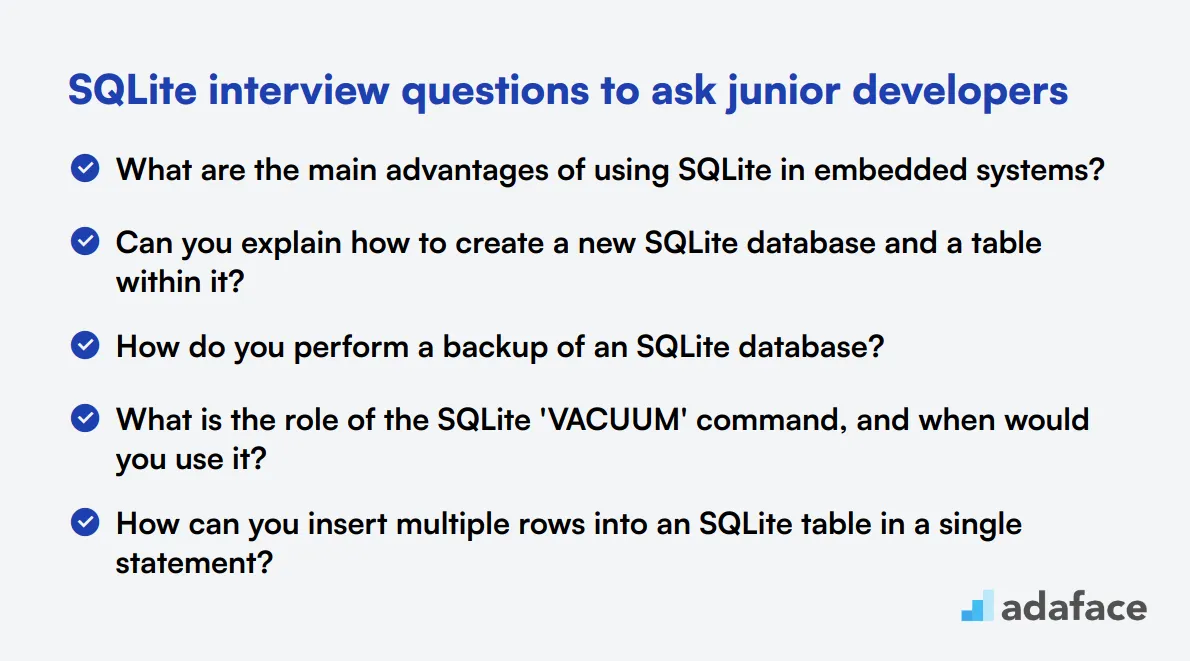
To assess whether junior developers have a solid understanding of SQLite, use this list of targeted interview questions. These inquiries will help you gauge their knowledge of key concepts and practical skills necessary for roles like a SQL Developer.
- What are the main advantages of using SQLite in embedded systems?
- Can you explain how to create a new SQLite database and a table within it?
- How do you perform a backup of an SQLite database?
- What is the role of the SQLite 'VACUUM' command, and when would you use it?
- How can you insert multiple rows into an SQLite table in a single statement?
- What are the different data types supported by SQLite?
- Can you explain how to execute a raw SQL query in SQLite using a programming language of your choice?
- What is a 'view' in SQLite, and how do you create one?
- How do you handle errors in SQLite operations?
- Can you describe how to use foreign keys in SQLite and their importance?
5 intermediate SQLite interview questions and answers to ask mid-tier developers
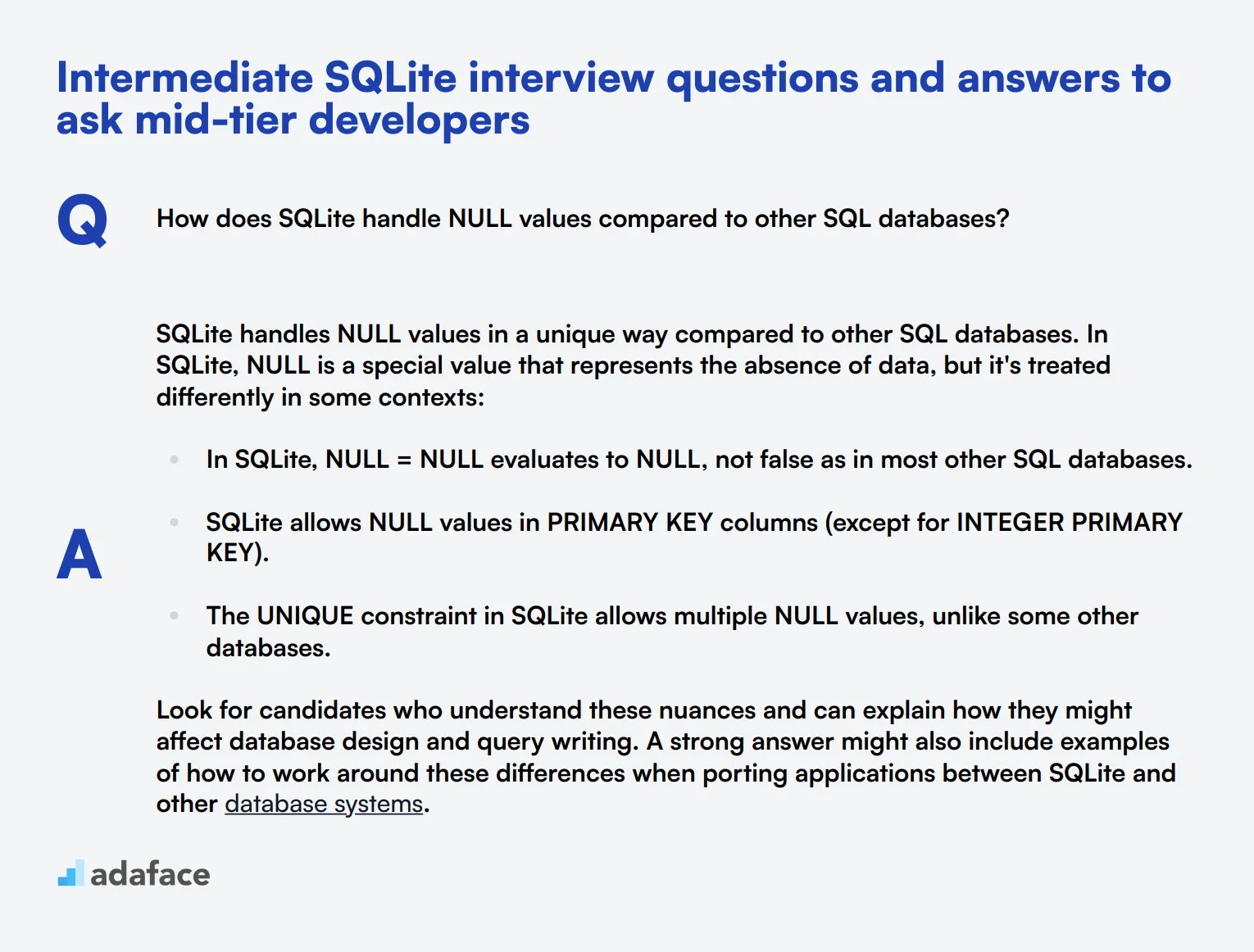
Ready to dive deeper into SQLite? These intermediate questions will help you gauge a candidate's understanding of SQLite's more nuanced features and use cases. Perfect for assessing mid-tier developers, this list will help you identify those who can handle complex database tasks and optimize SQLite performance. Remember, the best candidates will not only provide correct answers but also demonstrate practical knowledge and problem-solving skills.
1. How does SQLite handle NULL values compared to other SQL databases?
SQLite handles NULL values in a unique way compared to other SQL databases. In SQLite, NULL is a special value that represents the absence of data, but it's treated differently in some contexts:
- In SQLite, NULL = NULL evaluates to NULL, not false as in most other SQL databases.
- SQLite allows NULL values in PRIMARY KEY columns (except for INTEGER PRIMARY KEY).
- The UNIQUE constraint in SQLite allows multiple NULL values, unlike some other databases.
Look for candidates who understand these nuances and can explain how they might affect database design and query writing. A strong answer might also include examples of how to work around these differences when porting applications between SQLite and other database systems.
2. Explain the concept of 'PRAGMA' in SQLite and provide an example of its use.
PRAGMA in SQLite is a special command used to modify the operation of the SQLite library or to query the SQLite library for internal (non-table) data. It's a powerful feature that allows developers to control various aspects of SQLite's behavior.
Some common uses of PRAGMA include:
- Enabling or disabling foreign key constraints (PRAGMA foreign_keys = ON;)
- Changing the cache size (PRAGMA cache_size = 5000;)
- Querying the schema version (PRAGMA schema_version;)
- Setting the journal mode (PRAGMA journal_mode = WAL;)
An ideal candidate should be able to explain that PRAGMA commands are specific to SQLite and may not work in other database systems. They should also demonstrate an understanding of when and why to use PRAGMA commands, such as for performance tuning or ensuring data integrity. Follow up by asking about specific scenarios where they've used PRAGMA commands to solve problems or optimize database operations.
3. What is the purpose of the 'WITHOUT ROWID' table option in SQLite?
The 'WITHOUT ROWID' table option in SQLite is used to create tables without the implicit rowid column that SQLite normally adds to every table. This option can be beneficial in certain scenarios:
- It can reduce disk space usage for tables where you don't need an auto-incrementing primary key.
- It can improve performance for tables where you frequently search or sort by the primary key.
- It allows for more control over the table structure, especially when migrating from other database systems that don't use rowid.
A strong candidate should explain that while 'WITHOUT ROWID' can be useful, it's not always the best choice. They should mention that it's only applicable to tables with a PRIMARY KEY, and that it can sometimes lead to slower INSERT operations. Look for answers that demonstrate an understanding of the trade-offs involved and the ability to make informed decisions based on specific use cases and performance requirements.
4. How would you optimize a SQLite database for read-heavy operations?
Optimizing a SQLite database for read-heavy operations involves several strategies:
- Proper indexing: Create indexes on columns frequently used in WHERE clauses and JOIN conditions.
- Denormalization: Consider duplicating some data to reduce the need for complex JOINs.
- Use of PRAGMA commands: Adjust cache size and page size for better performance.
- Appropriate use of transactions: Wrap multiple read operations in a single transaction.
- Regular VACUUM: To keep the database file compact and efficient.
- Use of prepared statements: To reduce parsing overhead for repeated queries.
A strong candidate should be able to explain these concepts and discuss their trade-offs. They might also mention the importance of query optimization and the use of EXPLAIN QUERY PLAN to analyze query performance. Look for answers that demonstrate a holistic understanding of database optimization, considering not just SQLite-specific features but also general database design principles and the specific needs of read-heavy workloads.
5. Describe the concept of 'page size' in SQLite and its impact on database performance.
Page size in SQLite refers to the amount of data that can be stored in a single page of the database file. It's a fundamental concept that affects both storage efficiency and performance:
- SQLite stores data in pages, which are the smallest units of data that can be read from or written to disk.
- The default page size is 4096 bytes, but it can be set to values ranging from 512 to 65536 bytes.
- Larger page sizes can improve read performance for large amounts of data, but may waste space for small records.
- Smaller page sizes can be more efficient for random access of small records, but may increase the overhead for large datasets.
An ideal candidate should explain that choosing the right page size depends on factors like the typical size of records, the nature of queries (sequential vs. random access), and the hardware characteristics. They might also mention that page size can be set using the PRAGMA page_size command, but it requires rebuilding the database to take effect. Look for answers that demonstrate an understanding of the balance between storage efficiency and query performance, and the ability to make informed decisions based on specific use cases.
15 SQLite interview questions about database operations
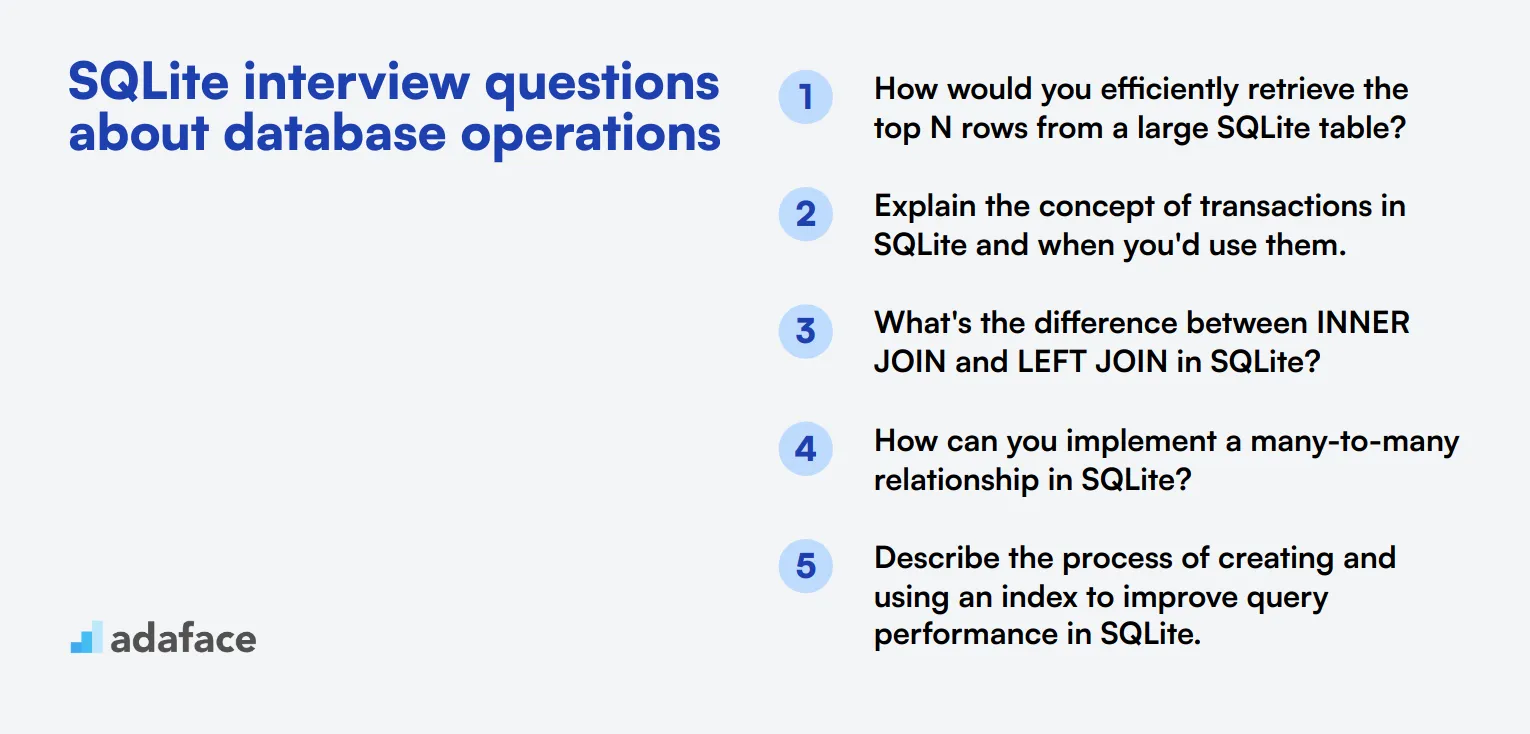
To assess candidates' proficiency in database operations with SQLite, use these 15 interview questions. They cover essential aspects of data manipulation, querying, and performance optimization, helping you identify skilled SQLite developers for your team.
- How would you efficiently retrieve the top N rows from a large SQLite table?
- Explain the concept of transactions in SQLite and when you'd use them.
- What's the difference between INNER JOIN and LEFT JOIN in SQLite?
- How can you implement a many-to-many relationship in SQLite?
- Describe the process of creating and using an index to improve query performance in SQLite.
- What's the purpose of the EXPLAIN QUERY PLAN command in SQLite?
- How would you handle date and time operations in SQLite?
- Explain the concept of subqueries in SQLite and provide an example.
- What are some best practices for optimizing SQLite database performance?
- How can you implement full-text search functionality in SQLite?
- Describe the process of adding a new column to an existing table in SQLite.
- What's the difference between DELETE and TRUNCATE operations in SQLite?
- How would you handle large dataset imports in SQLite efficiently?
- Explain the concept of UPSERT in SQLite and when it's useful.
- How can you implement data encryption in SQLite for sensitive information?
8 SQLite interview questions and answers related to optimization techniques
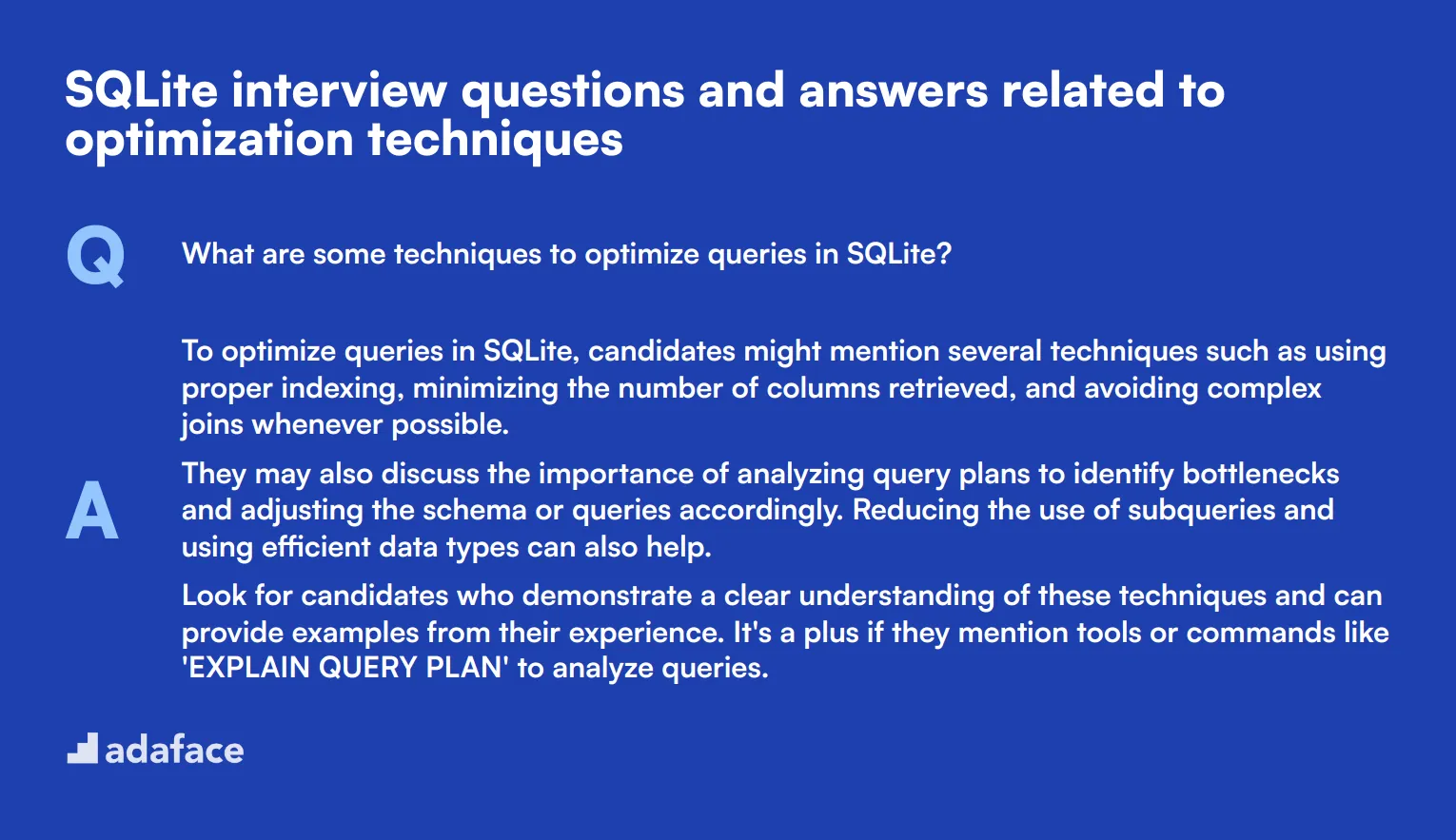
To determine whether your applicants have the skills to optimize SQLite databases effectively, ask them some of these 8 SQLite interview questions about optimization techniques.
1. What are some techniques to optimize queries in SQLite?
To optimize queries in SQLite, candidates might mention several techniques such as using proper indexing, minimizing the number of columns retrieved, and avoiding complex joins whenever possible.
They may also discuss the importance of analyzing query plans to identify bottlenecks and adjusting the schema or queries accordingly. Reducing the use of subqueries and using efficient data types can also help.
Look for candidates who demonstrate a clear understanding of these techniques and can provide examples from their experience. It's a plus if they mention tools or commands like 'EXPLAIN QUERY PLAN' to analyze queries.
2. How would you reduce the size of a SQLite database?
Reducing the size of a SQLite database can be achieved by several methods. Candidates might mention using the 'VACUUM' command to reclaim unused space. They could also discuss the importance of properly defining data types to avoid unnecessary storage usage.
Additionally, they might bring up techniques like normalization to minimize redundancy or using compression for large text fields.
An ideal candidate will not only list these techniques but also explain when and how to use them effectively, indicating their practical understanding and experience with database management.
3. What is the significance of indexing in SQLite optimization?
Indexing is crucial in SQLite optimization as it significantly speeds up data retrieval. By creating indexes on columns that are frequently queried or used in JOIN operations, the database engine can locate rows more quickly.
However, candidates should also mention the trade-offs, such as the additional storage space required for indexes and the impact on write operations.
Look for candidates who demonstrate a balanced understanding of the benefits and drawbacks of indexing and can discuss scenarios where indexing would be most beneficial.
4. How would you optimize SQLite for write-heavy operations?
For write-heavy operations, optimization strategies might include batching multiple write operations into a single transaction, which reduces the overhead of transaction management.
Using the 'PRAGMA synchronous' settings to control the level of synchronization and speed up writes without significantly compromising data integrity could also be mentioned.
A strong candidate will mention these techniques and possibly share additional insights or experiences from their past projects, demonstrating a thorough understanding of write optimization.
5. How do you use the EXPLAIN QUERY PLAN command in SQLite for optimization?
The 'EXPLAIN QUERY PLAN' command in SQLite helps analyze how the database engine executes a query. It provides information about the query execution plan, showing how tables are accessed and joined.
Candidates should mention that this command is valuable for identifying bottlenecks and inefficiencies, allowing for targeted optimizations.
Ideal responses will include an understanding of interpreting the output from 'EXPLAIN QUERY PLAN' and applying appropriate optimization techniques based on the analysis.
6. What are some best practices for optimizing SQLite database performance?
Best practices for optimizing SQLite performance include using indexes appropriately, optimizing query structure, and managing transactions efficiently. Avoiding unnecessary columns in SELECT statements and using views can also help.
Candidates might also mention using the 'VACUUM' command regularly to maintain database health and employing the 'PRAGMA' commands for fine-tuning performance settings.
Look for candidates who can articulate these practices clearly and provide examples from their experience, showing a practical understanding of how to implement them.
7. How would you handle large dataset imports in SQLite efficiently?
Efficiently handling large dataset imports in SQLite might involve using transactions to group multiple inserts, which reduces the overhead of transaction management.
Candidates could also discuss the use of bulk insert operations and disabling indexes temporarily during the import process to speed up data insertion.
An ideal candidate will explain these techniques and provide insights into their practical application, demonstrating a deep understanding of performance optimization during large data imports.
8. Explain the importance of using appropriate data types in SQLite.
Using appropriate data types in SQLite is important for ensuring efficient storage and query performance. Proper data types help minimize storage requirements and enhance data retrieval speed.
Candidates should mention that mismatched data types can lead to unnecessary type conversions and slow down query execution. Ensuring that the data types align with the actual data stored can also prevent errors.
Look for candidates who demonstrate a clear understanding of data type selection and its impact on database performance, possibly giving examples from their experience.
7 situational SQLite interview questions with answers for hiring top developers
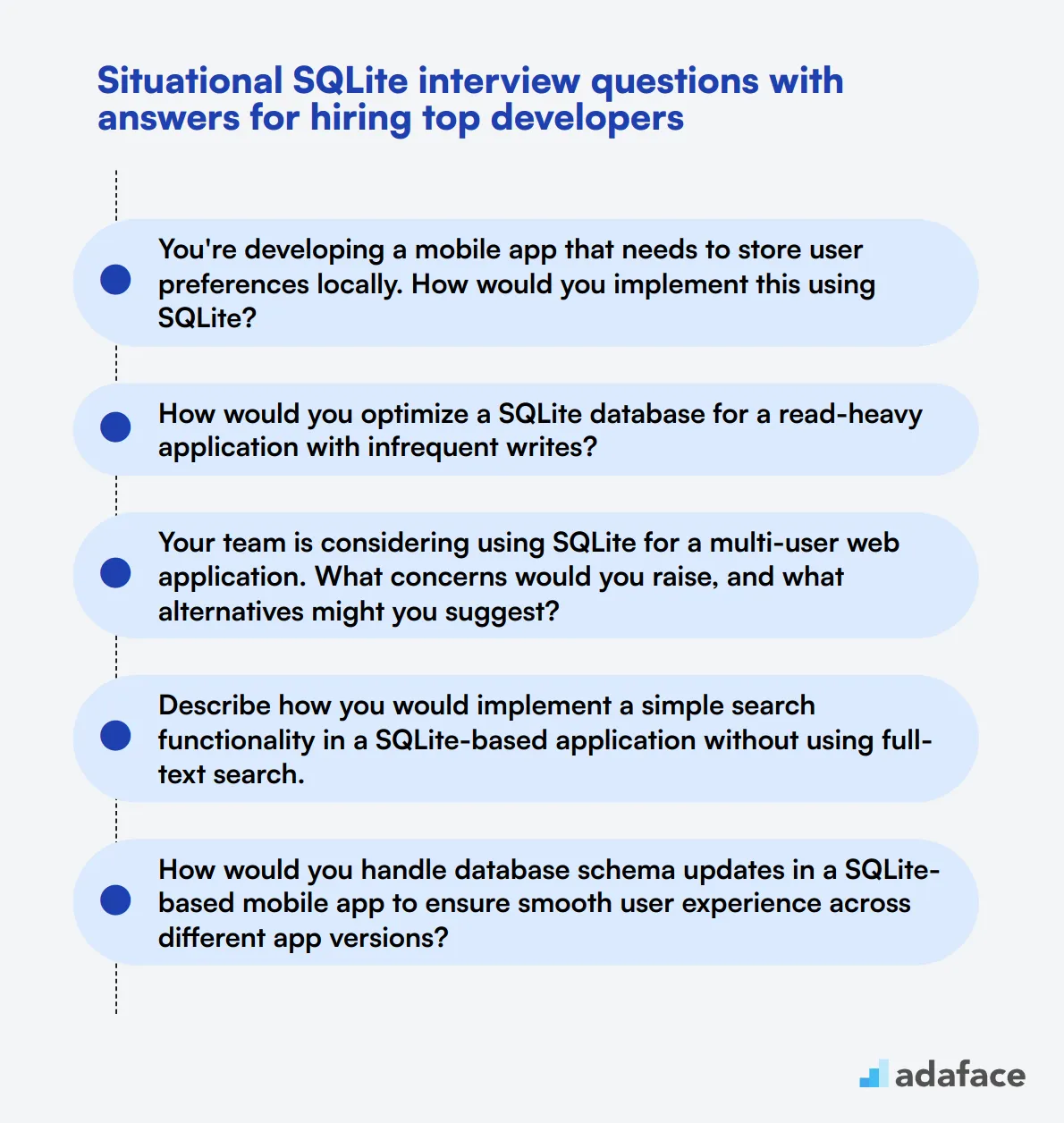
Ready to put your SQLite candidates through their paces? These situational questions will help you uncover how well applicants can apply their SQLite knowledge in real-world scenarios. Use this list to gauge a candidate's problem-solving skills and their ability to think critically about database design and optimization.
1. You're developing a mobile app that needs to store user preferences locally. How would you implement this using SQLite?
A strong candidate should outline a strategy like this:
- Create a simple SQLite database with a table for user preferences
- Use key-value pairs to store preferences (e.g., column for preference name, column for preference value)
- Implement CRUD operations to manage preferences
- Ensure the database is created or opened when the app launches
- Use transactions for multiple preference updates to ensure data integrity
Look for candidates who consider the simplicity and efficiency of their solution, as well as how they handle potential issues like data types and default values.
2. How would you optimize a SQLite database for a read-heavy application with infrequent writes?
An experienced candidate should suggest several optimization techniques:
- Create appropriate indexes on frequently queried columns
- Use the ANALYZE command to gather statistics for the query planner
- Consider denormalizing data to reduce JOINs in common queries
- Use the appropriate data types to minimize storage and improve query performance
- Implement caching mechanisms at the application level to reduce database load
- Use the WAL (Write-Ahead Logging) journal mode for better concurrency
Pay attention to candidates who discuss the trade-offs of each optimization technique and how they would measure the impact of these changes.
3. Your team is considering using SQLite for a multi-user web application. What concerns would you raise, and what alternatives might you suggest?
A knowledgeable candidate should highlight SQLite's limitations in this scenario:
- Limited concurrency: SQLite uses file-level locking, which can be problematic for multiple simultaneous writes
- Lack of user management and access control features
- Limited scalability for high-traffic applications
- No built-in network protocol for remote access
For alternatives, they might suggest:
- PostgreSQL or MySQL for better concurrency and user management
- MongoDB or other NoSQL databases if the data structure is flexible
- A combination of SQLite for local caching and a server-based database for primary storage
Evaluate the candidate's understanding of different database systems and their ability to match technology to specific use cases.
4. Describe how you would implement a simple search functionality in a SQLite-based application without using full-text search.
A practical approach from a candidate might include:
- Using the LIKE operator with wildcards for basic pattern matching
- Creating indexes on columns frequently used in search queries
- Implementing case-insensitive searches using the LOWER() function
- Breaking down search terms and using multiple LIKE conditions
- Considering the use of GLOB for more complex pattern matching
Look for candidates who discuss the performance implications of their approach and suggest ways to optimize for larger datasets, such as limiting result sets or using more advanced techniques like trigram matching.
5. How would you handle database schema updates in a SQLite-based mobile app to ensure smooth user experience across different app versions?
A well-thought-out answer should cover:
- Implementing a versioning system for the database schema
- Using SQLite's ALTER TABLE command for simple changes
- For complex changes, creating a new table and migrating data
- Implementing a migration system that runs necessary updates based on the current schema version
- Ensuring backward compatibility for users who might skip versions
- Testing migration paths thoroughly, including edge cases
Evaluate the candidate's approach to maintaining data integrity and minimizing user disruption during updates. Look for mentions of backup strategies and rollback plans in case of migration failures.
6. In a SQLite-based IoT application, you're experiencing data corruption issues. How would you diagnose and address this problem?
A comprehensive answer should include steps like:
- Check system logs for I/O errors or unexpected shutdowns
- Use SQLite's integrity_check pragma to identify corruption
- Implement proper error handling and transaction management in the application
- Consider using WAL mode to improve durability
- Implement a robust backup and recovery strategy
- Use SQLite's busy timeout to handle concurrent access issues
- Ensure proper closing of database connections, especially in low-power scenarios
Look for candidates who demonstrate a systematic approach to problem-solving and understand the unique challenges of embedded systems and IoT environments.
7. You need to implement a simple audit trail in a SQLite database. How would you approach this?
An effective solution might include:
- Creating an audit table to store changes (e.g., table name, operation type, timestamp, user ID)
- Implementing triggers on INSERT, UPDATE, and DELETE operations
- Using the sqlite_master table to dynamically create triggers for all tables
- Storing old and new values for UPDATE operations
- Considering performance impact and potential use of separate audit database
Assess the candidate's understanding of SQLite triggers and their ability to balance functionality with performance considerations. Look for mentions of data retention policies and how they might handle large volumes of audit data.
Which SQLite skills should you evaluate during the interview phase?
While it's challenging to assess every aspect of a candidate's SQLite proficiency in a single interview, focusing on core skills can provide valuable insights. The following key areas are particularly important when evaluating SQLite expertise during the interview process.
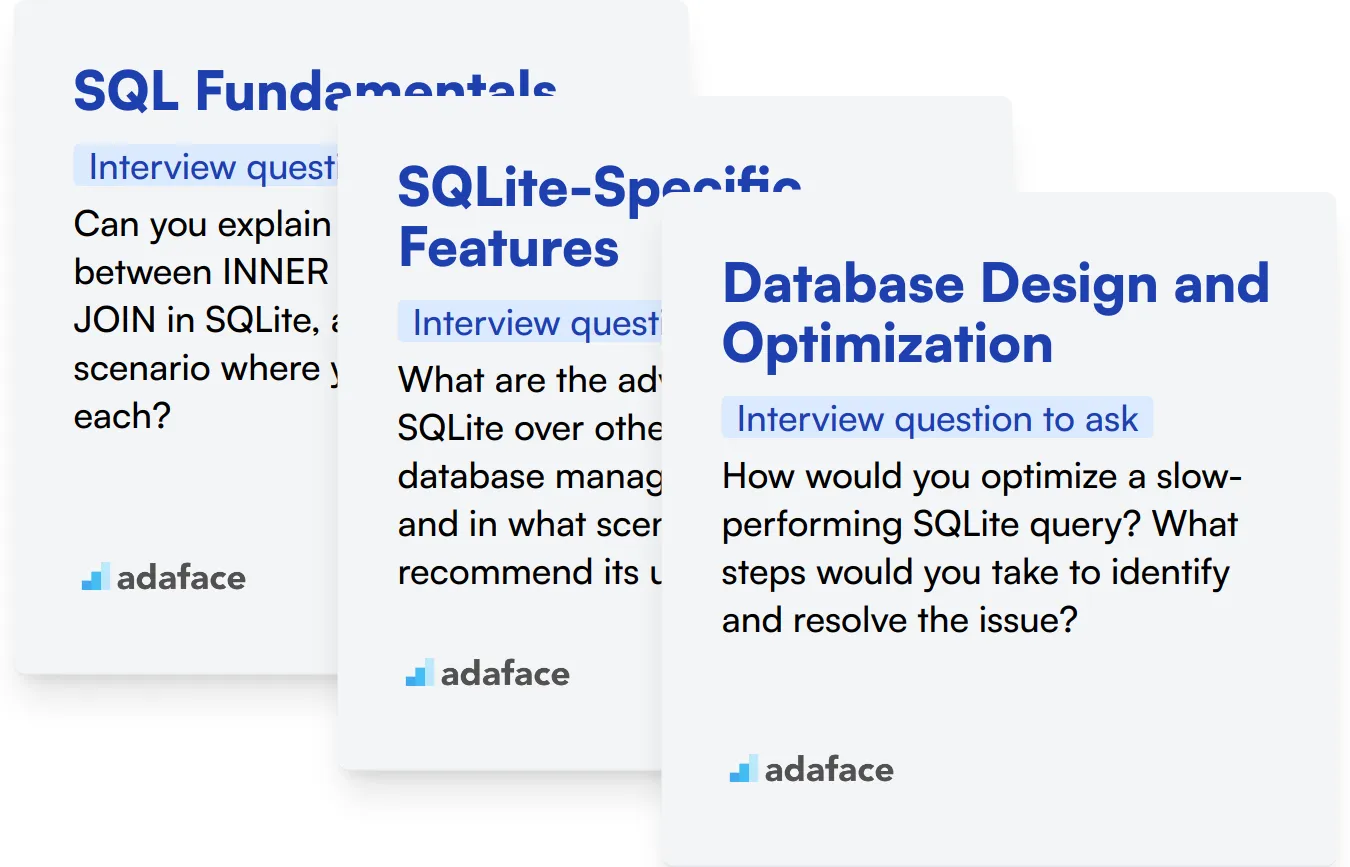
SQL Fundamentals
A strong grasp of SQL fundamentals is essential for working with SQLite. This includes understanding basic queries, data manipulation, and table creation.
To evaluate this skill efficiently, consider using an SQL online test that includes relevant multiple-choice questions. This can help filter candidates based on their foundational knowledge.
During the interview, you can ask targeted questions to assess the candidate's SQL proficiency. Here's an example question:
Can you explain the difference between INNER JOIN and LEFT JOIN in SQLite, and provide a scenario where you would use each?
Look for answers that demonstrate understanding of join types and their practical applications. A good response should explain that INNER JOIN returns matching rows from both tables, while LEFT JOIN returns all rows from the left table and matching rows from the right table.
SQLite-Specific Features
Knowledge of SQLite-specific features sets it apart from other database systems. This includes understanding its serverless nature, file-based structure, and data types.
To assess this skill, you can use an SQLite online test that focuses on SQLite-specific concepts and features.
To evaluate this during the interview, consider asking a question like:
What are the advantages of using SQLite over other relational database management systems, and in what scenarios would you recommend its use?
Look for answers that highlight SQLite's lightweight nature, zero-configuration setup, and suitability for embedded systems or local storage in applications. Candidates should also mention its limitations for high-concurrency scenarios.
Database Design and Optimization
Effective database design and optimization are crucial for SQLite performance. This skill involves creating efficient schemas, indexing, and query optimization.
To assess this skill during the interview, you might ask:
How would you optimize a slow-performing SQLite query? What steps would you take to identify and resolve the issue?
Look for responses that mention analyzing the query execution plan, proper indexing, denormalization when appropriate, and query rewriting techniques. Candidates should also discuss the importance of understanding the specific use case and data patterns.
Maximizing the Effectiveness of SQLite Interview Questions
Before putting your newly acquired knowledge to use, consider these tips to enhance your SQLite interview process. These suggestions will help you make the most of your candidate evaluations.
1. Implement Skills Tests Before Interviews
Using skills tests before interviews can significantly streamline your hiring process. They provide an objective measure of a candidate's SQLite proficiency, saving time and resources.
For SQLite roles, consider using a SQLite online test to assess basic to advanced knowledge. You might also want to include a SQL coding test to evaluate practical skills.
These tests help filter candidates based on their actual abilities, ensuring that only qualified individuals proceed to the interview stage. This approach allows you to focus your interview time on discussing more complex topics and assessing cultural fit.
2. Prepare a Balanced Set of Interview Questions
When preparing for the interview, compile a mix of technical and practical SQLite questions. This balanced approach helps you assess both theoretical knowledge and real-world application skills.
Consider including questions about database design, query optimization, and SQLite-specific features. You might also want to add some data modeling interview questions to gauge the candidate's broader database skills.
Remember to tailor your questions to the specific role and level you're hiring for. This ensures you're evaluating candidates on the most relevant aspects of the job.
3. Master the Art of Follow-Up Questions
Asking follow-up questions is crucial to truly understand a candidate's depth of knowledge. It helps you differentiate between those who have memorized answers and those who truly understand SQLite concepts.
For example, if you ask about SQLite indexing, a follow-up could be, 'Can you explain a situation where indexing might not improve query performance?' This probes the candidate's practical understanding and problem-solving skills.
Use SQLite interview questions and skills tests to hire talented developers
If you are looking to hire someone with SQLite skills, you need to ensure they have those skills accurately. The best way to do this would be to use skill tests. You might want to check out our SQLite online test and other relevant assessments from our test library.
Once you use these tests, you can shortlist the best applicants and call them for interviews. To get started, you can sign up here or find more information about our online assessment platform.
SQLite Online Test
Download SQLite interview questions template in multiple formats
SQLite Interview Questions FAQs
Key topics include basic knowledge, database operations, optimization techniques, and situational problem-solving.
These questions help gauge a candidate's technical proficiency, problem-solving skills, and practical experience with SQLite.
Yes, tailoring questions for junior, mid-tier, and senior developers ensures you assess their skills accurately.
These questions present real-life scenarios to candidates to evaluate their problem-solving approaches and decision-making skills.
Optimization techniques are crucial for assessing a candidate's ability to enhance database performance, which is often a key requirement.
Yes, combining practical tests with interview questions provides a comprehensive evaluation of the candidate's abilities.

40 min skill tests.
No trick questions.
Accurate shortlisting.
We make it easy for you to find the best candidates in your pipeline with a 40 min skills test.
Try for freeRelated posts
Free resources




